Interfaith Encounter Activities
No dialogue between faiths, without dialogue between friends. This principle drives our
movement to open up various spaces for creative interfaith encounters, which encourage
friendship in diversity for young people. Some examples of these efforts are:
- Youth Interfaith Camp (YIC)
An interfaith camp specifically for the youth from the western part of Java (West Java, Jakarta and Banten provinces), where young people from various religions meet and interact to encourage the development of interfaith movements and communities at their local levels and to be involved in campaigning for tolerance and peace. Pasundan Christian Church (GKP) and JAKATARUB, supported by Mission-21, have been holding this activity since 2005. YIC is one of the pioneers of interfaith encounter for young people, especially in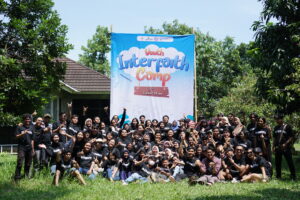 the western part of Java. This interfaith camp is also one of the activities that from the start developed an interactive and problem-facing model of diversity education. Furthermore, this activity also encourages the formation of interfaith communities in several cities/regencies and becomes a forum of the new activists for the continuity of existing interfaith communities.
the western part of Java. This interfaith camp is also one of the activities that from the start developed an interactive and problem-facing model of diversity education. Furthermore, this activity also encourages the formation of interfaith communities in several cities/regencies and becomes a forum of the new activists for the continuity of existing interfaith communities.
YIC also received the recognition award from the Austrian Federal Ministry for European and International Affairs on Intercultural Achievement Award (IAA) 2023 as one of interfaith initiatives. - Walking on Diversity Route An exploration activity for various places of worship in Bandung. In this route, participants can see the diversity of ornaments and rituals of various
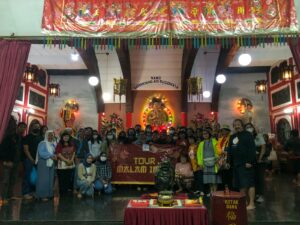 religions and their sects. We will find several Protestant and Catholic churches, Taoist Temple, Confucian Temple, Buddhist temples and monasteries, Hindu’s prayer rooms, and mosques (Sunni, Shia and Ahmadi). These fun walks are liked by various groups: the children, teenagers, youth and adults.
religions and their sects. We will find several Protestant and Catholic churches, Taoist Temple, Confucian Temple, Buddhist temples and monasteries, Hindu’s prayer rooms, and mosques (Sunni, Shia and Ahmadi). These fun walks are liked by various groups: the children, teenagers, youth and adults.
Watch the feature news about this Diversity Route here (Indonesian subtitle)
- Religious Cafe A simple encounter room, where there are a number of religious stands and people are free to ask questions about that religion. This activity is one of the most effective means of
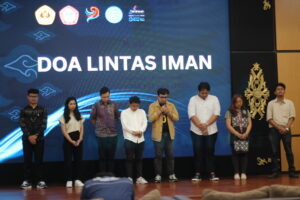 overcoming prejudice and opening up spaces for dialogue. Mainly because the opportunity to ask and confirm like this is rare opportunity in daily life.
overcoming prejudice and opening up spaces for dialogue. Mainly because the opportunity to ask and confirm like this is rare opportunity in daily life.
- A Friendship Encounter (Anjangsana) Anjangsana brings together two or more schools with different
religious backgrounds (public schools, Christian schools, Islamic Boarding schools, Buddhist schools, etc.).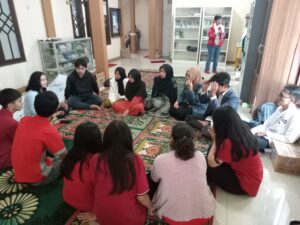
Through Anjangsana the students then get acquainted, play and compose works together. This is an effort to introduce and provide diversity experiences from an early age.
Watch the Anjangsana’s short movies here (English Subtitle)
- Knitting the Diversity This moment is specifically for people (children, women and religious leaders)
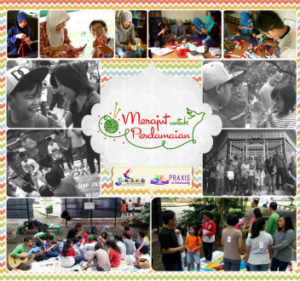 who have experienced discrimination, so that they learn not to hate other people who are different, especially those who have hurt them. Through this moment, they are reunited with different colleagues who also support diversity. An example that has been done is Muslim students knitting Christmas gifts for Christian children whose churches were closed due to the demands of a group of organizations acting in the name of Islam.
who have experienced discrimination, so that they learn not to hate other people who are different, especially those who have hurt them. Through this moment, they are reunited with different colleagues who also support diversity. An example that has been done is Muslim students knitting Christmas gifts for Christian children whose churches were closed due to the demands of a group of organizations acting in the name of Islam.
- Interfaith Iftar We used the month of Ramadan as an interfaith agenda. Churches, Budhhist temples,
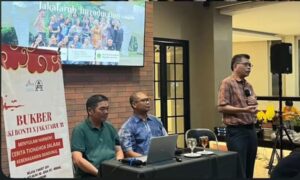 Confucian held iftar together inviting Muslim colleagues and interfaith friends, as well as
Confucian held iftar together inviting Muslim colleagues and interfaith friends, as well as
local residents. This is the moment we have been waiting for together.
- Hari Kebangsaan (National Day Event) We also used our national commemorations such as
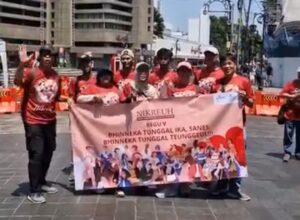 Pancasila Day, Youth Pledge, and other moments as spaces for cross-faith encounters. At each of these moments, it was always opened and closed with an interfaith prayer from representatives of all religions
Pancasila Day, Youth Pledge, and other moments as spaces for cross-faith encounters. At each of these moments, it was always opened and closed with an interfaith prayer from representatives of all religions
who attended the activity.
- Interfaith, Intergenerational, Intersectional and Inclusive Encounters Through various activities, we also encourage the growth of space for meetings between humanitarian issue activists and
 interfaith communities. We foster dialogue between generations that learn from each other about humanitarian issues (religious freedom, gender equality and diversity, disability, environment, labor, etc.) through events such as Cafe Humanity, Intergenerational Dialogue, FGDs of Religious Leaders and Young Leaders (PAGUNEMAN), as well as inclusive training.
interfaith communities. We foster dialogue between generations that learn from each other about humanitarian issues (religious freedom, gender equality and diversity, disability, environment, labor, etc.) through events such as Cafe Humanity, Intergenerational Dialogue, FGDs of Religious Leaders and Young Leaders (PAGUNEMAN), as well as inclusive training.
